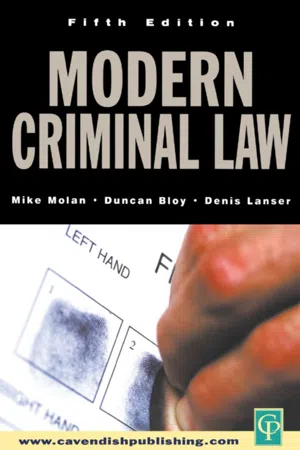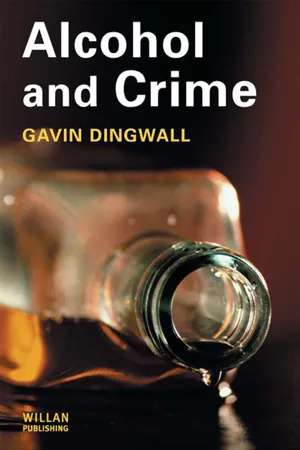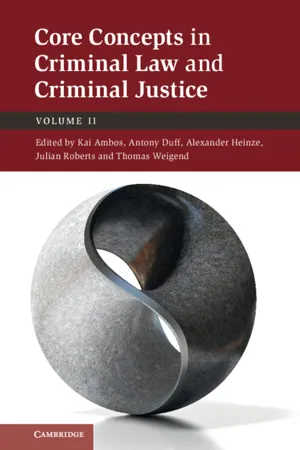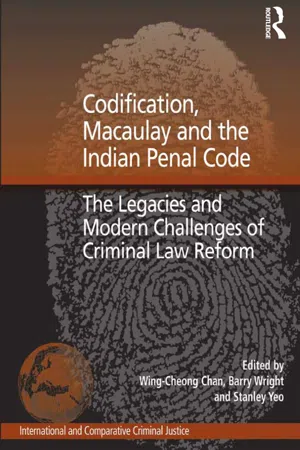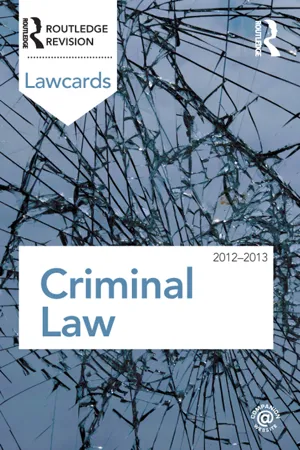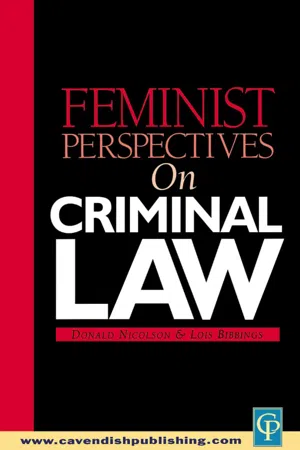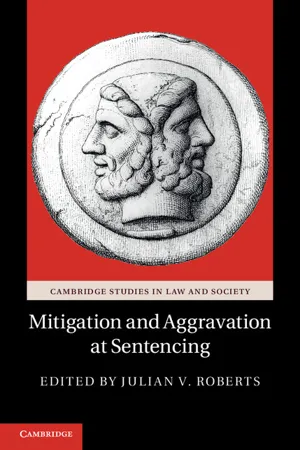Law
Intoxication defence
Intoxication defense refers to the legal argument that a person's state of intoxication at the time of committing a crime should be considered as a mitigating factor in determining their criminal liability. It can be used to argue that the individual was not in control of their actions due to being under the influence of alcohol or drugs, thus impacting their ability to form criminal intent.
Written by Perlego with AI-assistance
Related key terms
1 of 5
10 Key excerpts on "Intoxication defence"
- eBook - ePub
Modern Criminal Law
Fifth Edition
- Mike Molan(Author)
- 2013(Publication Date)
- Routledge-Cavendish(Publisher)
Hence, in McKnight (2000) The Times, 5 May, the fact that the accused had consumed large quantities of alcohol so that he could not remember what he had been doing at the time of the alleged offence was held not to be conclusive proof that he had been ‘intoxicated’ in the sense that the word is used to denote the defence at common law at the time. The degree of intoxication was the key issue. There had to be evidence that he had been prevented from having the required degree of foresight in respect of his actions—in particular, that he had been prevented by the intoxication from foreseeing or knowing what he would have foreseen or known had he been sober. The fact that an accused has been, without his knowledge, supplied with intoxicants that subsequently lower his inhibitions and lead him to perform criminal acts that he might not have performed had he been sober is again no defence, if there is evidence that the accused nevertheless acted with sufficient mens rea. The House of Lords in Kingston [1994] 3 All ER 353 expressly rejected any suggestions (accepted by the Court of Appeal) that the law should recognise a new defence of ‘disinhibition’, even though the accused was able to argue plausibly that it was not his ‘fault’ that he had had the mens rea. Intoxication may also form part of the actus reus of an offence, for example, s 3A of the RTA 1988 of causing death by careless driving when under the influence of drink or drugs. The Law Commission in its consultation paper, Intoxication and Criminal Liability (Law Com 127, 1993), puts it this way: The person who commits criminal acts while he is intoxicated, at least when he is voluntarily so intoxicated, does not therefore appeal to excuse; but rather raises the prior question of whether, because of his intoxicated state, he can be proved to have been in the (subjective) state of mind necessary for liability - eBook - ePub
- Gavin Dingwall(Author)
- 2013(Publication Date)
- Willan(Publisher)
Fotheringham (1988) 88 Cr.App.R.206).Primarily for reasons of space, the chapter will concern itself with the fundamental issue of attributing criminal liability to intoxicated individuals, although, in places some mention will be made to the relationship between intoxication and defences such as insanity and diminished responsibility.The four models of criminal liability
The remainder of this chapter will evaluate in turn the four main approaches to intoxication and criminal liability that can be observed in western legal systems. These can be grouped as follows: 1. Intoxication is irrelevant in all cases; 2. Intoxication may be relevant in cases of ‘specific’ intent but not those of ‘basic’ intent; 3. Intoxication may be relevant in cases of ‘basic’ intent and in cases of ‘specific’ intent; 4. Intoxication may be relevant in cases of ‘basic’ intent and in cases of ‘specific’ intent but in combination with an offence of causing harm whilst intoxicated. These categories can also be used to describe stages of development. England and Wales, for example, is currently in the second category yet this is only due to a gradual transition from the first category during the nineteenth century, whilst Canada has shifted categories more than once.1. Intoxication is irrelevant in all cases
This position represents the original position found in most common law countries (McAuley 1997; McCord 1992; Singh 1933). Today it still represents the law in Scotland and would appear to represent the stance taken in the Netherlands. The following case graphically illustrates both the simplicity and the consequences of such a position. When John Savage cut the throat of Jemima Grierson there were defence witnesses who were prepared to testify that Savage was drunk on the night in question. The Scottish High Court of Justiciary found this evidence to be totally irrelevant (HM Advocate v Savage - Kai Ambos, Antony Duff, Alexander Heinze, Julian Roberts, Thomas Weigend(Authors)
- 2022(Publication Date)
- Cambridge University Press(Publisher)
Across the common law and civil law traditions, this deviation has been conceptualised either as intoxication modifying the general rules on mens rea or as triggering ‘extraordinary’ criminal responsibility as an instance of actio libera in causa. These different conceptualisations have been advanced at different times, revealing the dynamic nature of philosophical conceptions of intoxica- tion. Further, we suggest that these conceptualisations reflect the ways in which intoxication has influenced the generalised notion of imputation, highlighting the dialogical relation between the ‘General Part’ and the ‘Special Part’ of the law of crime. 1 Deviations from Responsibility Principles in the Common Law (a) Intoxication as Modifying the General Rules on Mens Rea (i) United States In the aftermath of the Supreme Court’s judgment in Egelhoff, states are under no constitutional obligation to admit evidence of intoxication that might have a bearing on the defendant’s level of culpability. 54 Indeed, the vast majority of state statutes and court deci- sions deviate from a subjective approach to criminal responsibility and provide for the imputation of a culpable mental state to the intoxicated offender by denying the relevance of intoxication to certain charges. 55 They do so through one of two doctrinal formulae: the ‘specific intent’ doctrine and the partial responsibility model provided in the Model Penal Code. 56 Developed by courts as a ‘compromise between the conflicting feelings of sympathy and reprobation for the intoxicated offender’, the specific intent doctrine admits evidence of intoxication for offences containing a ‘specific intent’ element, but deems it immaterial for ‘general intent’ crimes. 57 The California Supreme Court’s decision in People v. Hood is 54 See Montana v. Egelhoff, 518 US 37, 49 (1996) (stating that voluntary intoxication has no exculpatory effect in ten states).- eBook - ePub
Codification, Macaulay and the Indian Penal Code
The Legacies and Modern Challenges of Criminal Law Reform
- Barry Wright, Wing-Cheong Chan(Authors)
- 2016(Publication Date)
- Routledge(Publisher)
Chapter 2 .41 See, for example, DPP v. Beard, above n. 21, at 501–2.42 See, for example, C.N. Mitchell, ‘The Intoxicated Offender – Refuting the Legal and Medical Myths’ (1988) 11 International Journal of Law and Psychiatry 77, at 91, where the author cites studies indicating that intoxicated accused persons are rarely unaware of their actions and rarely act without intent. While intoxication may make people less concerned about the consequences of their actions, it seldom renders them unable to perceive those consequences.- voluntary intoxication is no defence even if it negates the subjective fault elements for the offence committed;43
43 Intoxication is not normally a defence to crimes of objective fault because the reasonable person is not a voluntarily intoxicated person.
- voluntary intoxication is a defence for crimes of specific intent, but not basic intent, provided the intoxication negates the specific intent (and if intoxication does negate the specific intent, the offender may be convicted instead, in some or all cases, of a lesser included basic intent or objective fault offence, or perhaps a new separate offence of criminal intoxication); and
- voluntary intoxication is a defence for any subjective fault crime (whether specific or general), provided the intoxication negates that subjective state of mind (and if the intoxication does negate the requisite subjective fault, the offender may be convicted instead, in some or all cases, of a lesser included objective fault offence, or perhaps a new separate offence of criminal intoxication).
There are weaknesses and disadvantages to each of these options. I will argue in the remainder of this chapter that options (1) and (2) are too narrow and that option (3), combined with conviction for a separate, lesser included intoxication offence, constitutes the most principled and fairest approach to the issue of voluntary intoxication. - eBook - ePub
- Rodger Geary(Author)
- 2012(Publication Date)
- Routledge-Cavendish(Publisher)
While it is common knowledge that intoxication may lead to aggressive and dangerous behaviour, there will be cases where neither the individual’s experience nor the circumstances of the intoxication suggest any real risk of this. In such a case it is suggested that even gross voluntary intoxication does not involve such a degree of culpability as to justify criminal liability.The argument against the creation of a new offence of criminal intoxication is, thus, a two pronged one of principle and policy. Voluntary intoxication negating mens rea is a conception of fault which is too broad to justify conviction for serious offences, especially if there is no good reason for supposing that it will achieve the policy of social defence any more effectively than ordinary principles of liability.The Home Office has recently issued a consultation paper on offences against the person which includes proposals relating to intoxication (see ‘Offences against the person: the Home Office Consultation Paper’ [1998] Crim LR 317). Clause 19(1)(b) appears to be an unhappy deviation from the former proposals discussed above. It provides that a person who was voluntarily intoxicated at any material time must be treated: ‘... as having known or believed in any circumstances which he would have known or believed in had he not been intoxicated.’This is complicated and unsound in principle since it attributes to the defendant a belief which he did not in fact hold. It is suggested that a better provision would be to enact the Law Commission’s proposals discussed above, but that the best possible solution would be to simply abolish the Majewski rule and follow the Australian model.MistakeMistake of FactA mistake of fact is a defence where it prevents the defendant from forming the mens rea for the crime in question. For example, if the defendant mistakenly, but honestly, believes that the woman he is having intercourse with consents, he will not be guilty of rape.The mistake must be an honest one, but it need not be a reasonable one (DPP v Morgan (1976)). Where the offence in question can be committed negligently, then, in order to negate mens rea, the mistake must be not only honest, but also reasonable (R v Tolson - eBook - ePub
- Routledge(Author)
- 2013(Publication Date)
- Routledge(Publisher)
For example, the defendant’s drink has been ‘spiked’. Where the intoxication is involuntary the defendant will be entitled to a defence if the intoxication means that the defendant did not form the mens rea of the offence (R v Kingston [1994]). If the defendant is mistaken as to the strength of the alcohol, this is voluntary intoxication (R v Allen [1988]). It should be noted that, where the defendant deliberately becomes intoxicated with the intention of giving himself confidence in order to commit an offence, the defence will not be allowed (AG for Northern Ireland v Gallagher [1963]). Voluntary intoxication This is where the intoxication is self-induced, the defendant knowingly consumes an intoxicant. Where the intoxication is voluntary, intoxication is only relevant if the offence is one of ‘specific intent’ (DDP v Beard [1920]). If the crime is one of specific intent then intoxication is only a defence if it means that the defendant did not form the mens rea required. Voluntary intoxication is always irrelevant in relation to crimes of basic intent. The specific/basic distinction Unfortunately, there is no clear overarching principle for distinguishing crimes of specific and basic intent. The term ‘specific intent’ was first coined by the then Lord Chancellor Lord Birkenhead in DPP v Beard [1920]. He recognised if the drunkenness had meant that the defendant did not form the needed mens rea, this would have been taken into account since ‘specific intent is an essential element in the offence’ of murder. Later judgments gave the term ‘specific intent’ a specialised meaning which Lord Birkenhead probably never intended. Judges drew a distinction between crimes of specific and basic intent. In DDP v Majewski [1977], the House of Lords held that intoxication was no defence since assault is an offence of basic intent - eBook - ePub
- Lois Bibbings, Donald Nicolson(Authors)
- 2013(Publication Date)
- Routledge-Cavendish(Publisher)
A v UK lay in the law, rather than in practice.The final point which will be made concerning the implementation of the Human Rights Act 1998 relates to the denial of intoxication as a defence to crimes of basic intent. In Daviault,110 Canada’s Supreme Court ruled that non-application of intoxication as a defence to rape (being a crime of general intent)111 breached that country’s Charter of Rights: ‘[T]he mental aspect of an offence has long been recognized as an integral part of crime and to eliminate it would be to deprive an accused of fundamental justice.’The Supreme Court, by a majority, defended their approach by asserting that intoxication does not ‘cause’ criminal behaviour, referring to studies which showed that alcohol was better regarded as a:…‘facilitator’ of violence…that…alcohol abuse makes it easier for violence to occur, either by blurring the boundaries between what is and what is not acceptable behaviour or by removing conscious recognition of rules governing acceptable behavior altogether [and that] alcohol or drug abuse may serve as a conscious accompanier of violent behavior, in that some offenders use alcohol or drug abuse to excuse a violent act (for example, some instances of wife battering).The majority pointed out that such effects would not be regarded as sufficient to deny the existence of mens rea, confining their new defence to cases where defendants behaved, effectively, as automatons. They contended that the ‘floodgates’ would not be opened by their decision. But, within five months, Daviault had been relied upon by three defendants charged with assaults on women.112 In one case, Alberta’s Court of Queen’s Bench acquitted Carl Blair of assaulting his wife after he took large quantities of alcohol and prescription drugs. In another, a court in Quebec acquitted Pierre Theriault of spousal assault on the ground that his consumption of a large quantity of cocaine prior to the assault had rendered him unaware of his actions.113 - eBook - PDF
- Benedict Winiger, Ernst Karner, Ken Oliphant(Authors)
- 2018(Publication Date)
- De Gruyter(Publisher)
2 Though conceivably a defence of necessity might be pleadable were harm necessarily to be caused while the perpetrator was intoxicated. 1 2 3 1036 | 11. Incapacity due to Drugs or Alcohol E Quill 11/14 ought to have known, that the deceased was clearly unfit to drive and that given his condition there was a serious risk of his being unable to keep the car under proper control’ 3 (no concession was made for the pursuer’s own diminished capacity for judgement due to his own intoxication). The facts of this case differed from previous cases where injured parties had ac-tively encouraged dangerous criminal activity by defenders which had resulted in injury, thereby precluding them from claiming in delict for their injuries, 4 as the pursuer in this case had not been actively encouraging the commission of a criminal offence by the driver. 14. Ireland 14. Ireland 11/14 E Quill Boyne v Bus Átha Cliath, High Court, 11 April 2002 [2002] IEHC 135 Facts The plaintiff was intoxicated when he took a bus home at approximately 22.30. Shortly after alighting from the bus, the plaintiff stumbled and fell; as the bus pulled away from the stop the rear wheel rolled over his right leg, leaving it virtually useless. The plaintiff sued the bus company and driver. They pleaded contributory negligence. Decision Finnegan J apportioned 25% responsibility to the plaintiff for his injuries: he held that a plaintiff’s intoxication is relevant to the existence and the extent of a defen-dant’s duty of care, but added that: ‘In assessing the Plaintiff’s conduct for the purposes of contributory negligence his intoxicated state is to be disregarded and this is so whether notwithstanding his intoxicated state he knew or ought to have known of the risk which he was running or was incapable of so knowing.’ Comments Voluntary intoxication does not relieve a person of responsibility for contributory negligence. - eBook - PDF
- Julian V. Roberts(Author)
- 2011(Publication Date)
- Cambridge University Press(Publisher)
For example, in Lawrence (1988) Simon Brown J wrote: It is no mitigation whatever that a crime is committed to feed an addiction, whether that addiction be drugs, drink, gambling, sex, fast cars or anything else. If anyone hitherto has been labouring under the misapprehension that it was mitigation, then the sooner and more firmly they are disabused of it the better. However, it is difficult to draw clear guidance from recent case law, as, perhaps surprisingly, intoxication gets little discussion. Other issues usually appear more relevant to the Court of Appeal, and appear to ‘trump’ the intoxication factor. Intoxication can be, as the English guidelines suggest, an aggravating factor, but the case law would suggest that it can also serve either as a mitigating factor (reducing the serious- ness of the offence) or at least as offender mitigation. Finding clear general guidance is very difficult; the words used by a court do not always match the eventual sentence imposed. NICOLA PADFIELD 86 Exploring intoxication as a source of mitigation Let us start with the most serious offence, murder. Some people who kill when drunk will be convicted of murder, as an intent to kill formed by a person who is drunk is still an intent in law. But what is the impact of intoxication in determining their sentence? All those convicted of murder face a mandatory sentence of life imprisonment, with a lengthy minimum term (see Schedule 21 of the Criminal Justice Act 2003). Although many offenders convicted of murder had been drinking when they committed the offence, the role of alcohol in fixing the minimum term is often ignored. An obvious opportunity to clarify the issue was missed in Holmes (2010), who was convicted of the murder of his father. Clearly Holmes had been drinking heavily, and psychiatrists noted that this would have had a disinhibiting effect. - eBook - ePub
Murderous Minds on Trial
Terrible Tales from a Forensic Psychiatrist's Casebook
- Stanley Semrau, Judy Gale(Authors)
- 2001(Publication Date)
- Dundurn Press(Publisher)
If a drunk person stumbles and falls, that’s accidental, caused by a decline of physical competence. But if he tries to bribe a traffic officer or points a gun at someone, that’s intentional, the result of a thought process. The behaviour is clearly purposeful, goal-directed and would be extremely unlikely to occur as the random, bad-luck product of a nonoperating mind. The fact that it is still potentially accepted in court that a person can be “too drunk to form the intent to kill” keeps allowing cases to be decided based on misinformation. And unfortunately, the opinion of any expert witness who claims an accused is “too drunk” is more likely to be accepted by non-expert jurors if only because the court, by allowing this category, legitimizes it. Opposing views will be less readily accepted, given that psychiatry comes to the courtroom disadvantaged: much psychiatric evidence is considered “soft” data, whereas “hard” statistics, photographs, and perhaps even tears are easier to believe.Many crimes involve perpetrators who are under some degree of influence of alcohol or drugs. Some people drink to bolster their nerve in order to carry out their intentions. (The term “Dutch courage” came from the seventeenth-century habit of taking a tot of Dutch gin before going into battle.) Some drink to relieve themselves (even subconsciously) of some of the responsibility of their acts. There is tremendous scope for bogus claims of innocence as long as it is believed that intoxication destroys intent and, as a corollary, that individuals are not responsible for the outcome of their behaviour when drunk.The amnesia issue also seemed to muddy the waters. Alcohol does impair memory and chronic alcoholism can lead to chronic memory loss — but not being able to remember what happened bears no relation to what actually happened. That is, at the time, you had the intention to do something and you did it; whether or not you remember later is irrelevant, even though many people, including jurors, assume that absence of memory goes hand-in-hand with absence of awareness and intent at the time of the crime.Another issue this trial raised concerns the rule against the prosecution revealing past history (other than criminal record) which might be prejudicial to the accused. The rule is inherently sound and fair, as when it protects victims of rape. In this case, unfortunately, the rule worked in favour of the killer. Because I’m a doctor, not a lawyer, that may sound like pouting, but it is incredibly frustrating to see a jury decide a case while it is kept blind to relevant facts, such as an impressive string of prior spousal assaults.
Index pages curate the most relevant extracts from our library of academic textbooks. They’ve been created using an in-house natural language model (NLM), each adding context and meaning to key research topics.
